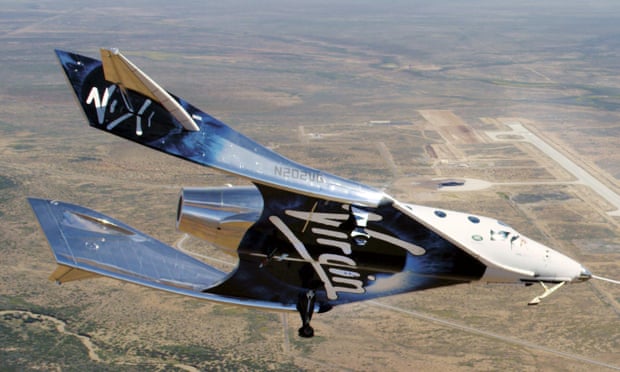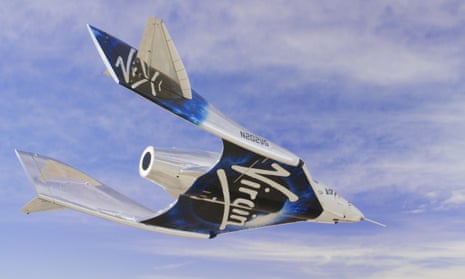Sir Richard Branson is to sell $500m (£405m) in Virgin Galactic shares in order to prop up his airline and leisure interests, which have been ravaged by the coronavirus crisis.
In a statement to the New York Stock Exchange, Branson’s Virgin Group said it intended to sell 25m shares via a series of transactions, prompting a 5% fall in the share price of Virgin Galactic during pre-market trading.
The shares, which account for just over a fifth of the billionaire’s stake in the space tourism business, were worth $500m at their pre-announcement price of $20. Virgin owns 81% of Vieco 10, the vehicle selling the shareholding, and will raise around $400m from the sale with the rest going to Aabar, an Abu Dhabi investment fund.
“Virgin intends to use any proceeds to support its portfolio of global leisure, holiday and travel businesses that have been affected by the unprecedented impact of Covid-19,” said the company.
The leisure and tourism sectors have been particularly hard hit by the pandemic, after governments around the world imposed strict curbs on travel to curb the spread of the virus. The freeze in global travel is affecting a host of Virgin Group companies, including Virgin Atlantic, as well as its holidays, cruises and hotels businesses.
The collapse in air travel forced Virgin Australia into administration and left Virgin Atlantic in severe financial difficulty.
The extent of Virgin Atlantic’s woes were underlined this month when the carrier announced plans to pull out of Gatwick airport and cut a third of jobs. The airline, in which Branson still holds a majority 51% stake, has been seeking emergency investment but is also seeking some form of state bailout to tide it over while planes remain grounded.
ProfileVirgin Galactic
Show

What is Virgin Galactic?
Sir Richard Branson unveiled his ambition to ferry tourists into outer space and back in 2004, initially proposing a maiden voyage by 2009.
More than a decade later, and after several false dawns when the first trip appeared tantalisingly close, would-be private astronauts are still waiting to climb on board a Virgin Galactic flight.
More than 600 have already put down deposits for the pleasure of suborbital space flight, with tickets selling for $250,000 (£202,000).
Buyers will have to travel from Spaceport America in New Mexico, the home of the SpaceShipTwo craft.
The rocket-powered plane will be launched from the air by another plane, Scaled Composites Model 348 White Knight Two, reaching 68 miles above the Earth, where passengers will experience weightlessness before returning via a conventional runway landing.
The project suffered a setback in 2014 when a version of SpaceShipTwo disintegrated mid-air owing to what an investigation found was a combination of pilot error and inadequate safety procedures. Co-pilot Michael Alsbury was killed, while pilot Peter Siebold was seriously injured.
Branson floated Virgin Galactic on the stock market last year, securing $450m investment from the former Facebook executive Chamath Palihapitiya.
After a successful test flight in May 2021, US authorities have now given the company permission to take paying customers to space.
The plea for UK taxpayer help has prompted a backlash, with people pointing to Branson’s vast personal wealth as a potential source of rescue funding. While the airline has not been profitable in recent years, it has at least recorded positive earnings in the past, registering three consecutive years in the black until 2017.
Virgin Galactic, by contrast, has never made a profit and has been plagued by successive delays to its plans to carry tourists into space for £202,000 per trip. Branson said last year he hoped to make the first trip “in months, not years” after securing £60m of deposits – £100,000 each from 600 customers.
Virgin Galactic is vying for space tourism supremacy with the SpaceX project launched by the Tesla founder, Elon Musk, and the Blue Origin venture headed by Amazon’s Jeff Bezos, the world’s richest person.
Branson floated the business on the stock market in October, securing $450m of funding through a merger with Social Capital Hedosophia, an investment vehicle run by the former Facebook executive Chamath Palihapitiya.
Investors were offered the chance to buy shares under the stock market ticker symbol “SPCE” for $12.34 each, with the stock rising above $20 as of close on Friday.
As well as selling shares in Virgin Galactic, Branson has said he will mortgage his private Caribbean island to raise money to help his business empire.
Branson, who is the UK’s seventh richest person with an estimated £4.7bn fortune, and has lived tax-free on Necker Island in the British Virgin Islands for the last 14 years, promised in a blogpost he would “raise as much money against the island as possible to save as many jobs as possible”.
